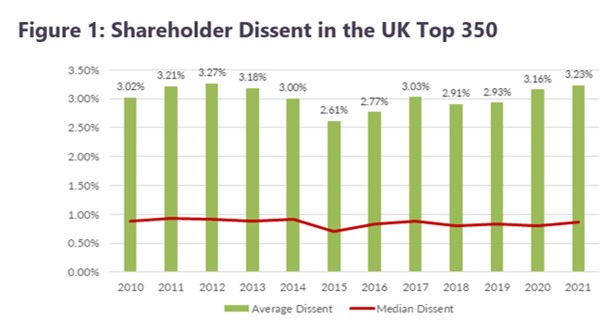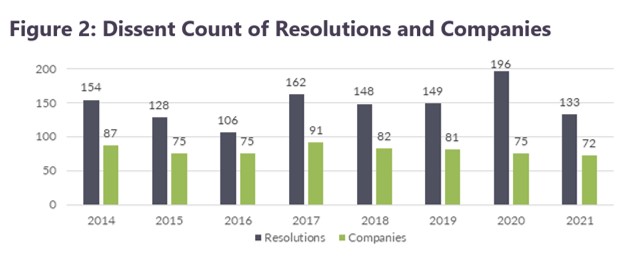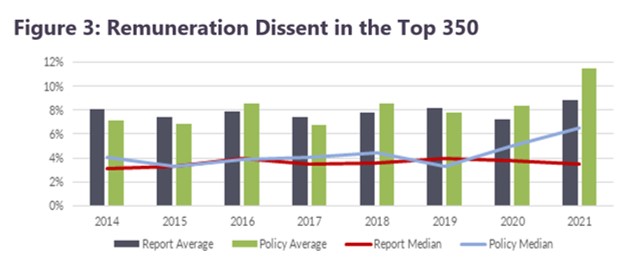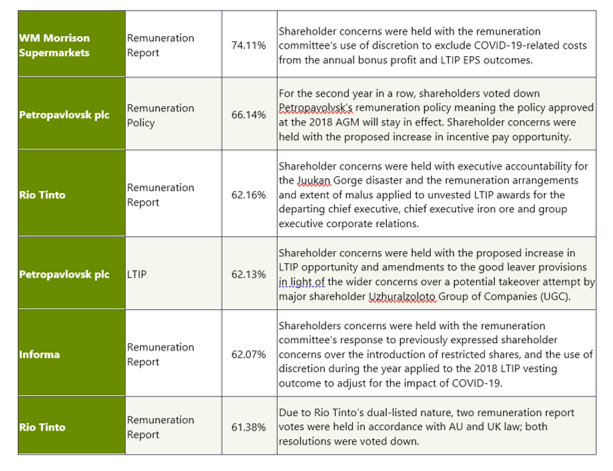Executive Pay
Executive Pay Watch: How Shareholders Voted At UK Top 350 CompaniesÂ

How did shareholders vote, and what level of dissent did they give voice to in the annual general meetings held by UK firms during the spring season? This article explores the details and crunches the numbers.
This month the team at independent corporate governance and proxy voting service Minerva Analytics looks at voting trends and shareholder dissent at the UK’s top 350 companies. Average overall dissent across all resolutions considered at shareholder meetings of the UK’s largest 350 companies was 3.23 per cent in the first half of 2021. Figure 1 below illustrates the mean and median yearly dissent over time. The voting results for the first half of the year suggests that the recent upward trend seen in shareholder dissent has continued this voting season.

High dissent resolutions
The chart below shows the number of companies and the number of
resolutions that received high dissent over the past eight years
since investors have had a binding vote on remuneration
policy.
In the first half of 2021, 72 companies have received 20 per cent
dissent or more on at least one resolution. Notably, over half
(52.78 per cent) were repeat offenders, meaning that the company
also received high dissent in 2020. This data would seem to
suggest a breakdown in communication between companies and
shareholders: either companies are not listening to feedback, or
shareholders are not explaining effectively - or possibly a
mixture of both.

Within the review period, 21 resolutions proposed by management
were voted down by shareholders. This compares with the 23
defeated resolutions in the full 2020 calendar year. The data
show that more resolutions have been voted down by shareholders
in the first half of 2021 than in each of the full calendar years
of 2014 to 2019. The results indicate that 2021 could become the
new record year for defeated management resolutions when all
shareholder meetings have been held and voting results
collected.
Remuneration
Executive pay continues to be a high-profile issue and
remuneration-related resolutions prove to be the most
consistently contentious resolution category of those routinely
proposed by management. The dissent level on remuneration
resolutions in the first half of the year stands at its highest
level since binding remuneration policy votes were introduced in
2014. Remuneration-related resolutions received on average 8.72
per cent shareholder dissent, more than double the 3.23 per cent
average. Notably, the average dissent on remuneration policy
resolutions in the first half of 2021 is over 10 per cent for the
first time.

Remuneration-related resolutions have overtaken board-related
resolutions for the highest count of high dissent resolutions in
2021. There were 60 high dissent remuneration-related
resolutions, more than the 59 remuneration-related resolutions in
the whole of 2020. The primary drivers behind the dissent appear
to be remuneration complexity, base pay increases larger than the
wider workforce, and the continuing impact of COVID-19 concerning
the use of discretion and/or adjustments.
During the 2020 and 2021 voting seasons, several companies have
adjusted their approach to remuneration in response to the
economic impact of the pandemic. The most common changes have
been a temporary reduction in base pay, a freeze on salary rates
and a delay in target setting. Other companies also adjusted
incentive pay outcomes, with some deferring annual bonus pay-outs
or cancelling the bonus in full.
Shareholders expect executive remuneration to be aligned with the
overall experience of the company, its shareholders, employees,
and other stakeholders. Institutional guidelines have also set
out an expectation for the use of government support, staff
redundancies, raising additional capital from shareholders and
the suspension of dividends and/or share buybacks to be reflected
in remuneration outcomes.
Despite clear shareholder expectations, many companies still
received high dissent due to perceptions of doing the wrong
thing. In some cases, the company in question receiving high
dissent had performed strongly but still received high dissent,
potentially indicating a wider attitude shift on remuneration and
societal expectations on fairness and shared sacrifice during the
pandemic.
These trends suggest that remuneration continues to dominate the
headlines and shareholder-board engagement. It also appears that
remuneration is increasingly being considered through an ESG
lens, with a number of the highest dissent resolutions connected
to ESG issues and questions over fairness and societal
expectations on responsible business behaviour during the
pandemic.

Methodology
For the purposes of this analysis, dissenting votes are those
purposely not cast in favour of a management proposal and include
both “abstain” and “against” votes. Under UK company law,
abstentions currently have no legal authority, but over many
years they have become a strong indicator of shareholder
sentiment and are used to demonstrate that they cannot fully
offer their support.
Companies have been classified as being a top 350 company as at
the date of their shareholder meeting during review period. The
period 2010 to 2020 covers a full year’s data while 2020 includes
1 January to 30 June.
The full voting review is available at:
www.manifest.co.uk/downloads/2021-uk-proxy-season-review